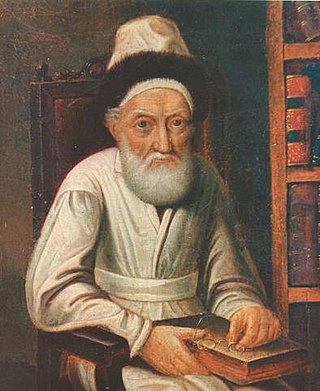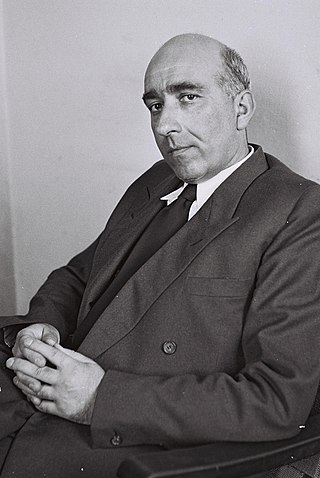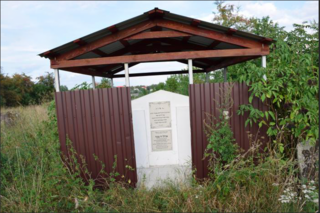
Chabad, also known as Lubavitch, Habad and Chabad-Lubavitch, is a branch of Orthodox Judaism, originating from Eastern Europe and one of the largest Hasidic dynasties. Chabad is one of the world's best-known Hasidic movements. It is one of the largest Hasidic groups as well as one of the largest Jewish religious organizations in the world. Unlike most Haredi groups, which are self-segregating, Chabad mainly operates in the wider world and it caters to secularized Jews.

A Rebbe or Admor is the spiritual leader in the Hasidic movement, and the personalities of its dynasties. The titles of Rebbe and Admor, which used to be a general honor title even before the beginning of the movement, became, over time, almost exclusively identified with its Tzadikim.

Menachem Mendel Schneersohn also known as the Tzemach Tzedek was an Orthodox rabbi, leading 19th-century posek, and the third rebbe of the Chabad Lubavitch Hasidic movement.

Breslov is a branch of Hasidic Judaism founded by Rebbe Nachman of Breslov (1772–1810), a great-grandson of the Baal Shem Tov, founder of Hasidism. Its adherents strive to develop an intense, joyous relationship with God, and receive guidance toward this goal from the teachings of Rebbe Nachman.

Shemaryahu Yosef Chaim Kanievsky was an Israeli Haredi rabbi and posek. He was a leading authority in Haredi Jewish society on legal and ethical practice. Known as the Gadol HaDor and the "Prince of Torah", much of his prominence came through Torah education and advice about Jewish law.

Elazar Menachem Man Shach was a Haredi rabbi who headed Lithuanian Orthodox Jews in Israel and around the world from the early 1970s until his death. He served as chair of the Council of Sages and one of three co-deans of the Ponevezh Yeshiva in Bnei Brak, along with Shmuel Rozovsky and Dovid Povarsky. Due to his differences with the Hasidic leadership of the Agudat Yisrael political party, he allied with Ovadia Yosef, with whom he founded the Shas party in 1984. Later, in 1988, Shach criticized Ovadia Yosef, saying that, "Sepharadim are not suitable for leadership positions" clearly viewing them as sub-Jewish, and subsequently founded the Degel HaTorah political party representing the Litvaks in the Israeli Knesset.

Shneur Chaim (HaKohen) Gutnick, was a prominent Orthodox Jewish Chabad rabbi in Australia. According to the Lubavitcher Rebbe he was the Chief Rabbi of Australia.

Grand Rabbi Shraga Feivish Hager, also known as the Kosover Rebbe, was the rebbe of the Kosov Hasidic dynasty, a dayan, and noted orator.

Yehuda Meir Abramowicz was an Israeli rabbi and politician. He served as general secretary of Agudat Yisrael, which he represented in the Knesset from 1972 until 1981, and as Deputy Speaker of the Knesset between 1977 and 1981. One of his achievements was the introduction of legislation requiring drivers of vehicles to wear seat belts.

Hillel HaLevi Malisov of Paritch, a levite by birth, commonly known as Reb Hillel Paritcher (1795-1864) was a famous Orthodox Jewish Chabad Rabbi born in Khmilnyk, Ukraine. Specifically, he served as a Mashpia and communal rabbi in the towns of Paritch, near Minsk, Russia, and Bobroisk, Belarus. He was considered exceptional in his scholarship and piety, and is referred to as a Tzadik, and even as a "half Rebbe."

Shtefanesht was a Hasidic dynasty named for the town of Ștefănești, Romania. It was one of the branches of the Ruzhiner dynasty, together with Bohush, Boyan, Chortkov, Husiatyn, and Sadigura. The dynasty lasted from 1851 to 1933 and had only two Rebbes: Rabbi Menachem Nochum Friedman, a son of the Ruzhiner Rebbe, and Rabbi Avrohom Mattisyohu Friedman, the only son of Rabbi Menachem Nochum. During the latter's reign, Ștefănești became one of the most important Hasidic centers in Eastern Europe.
Naftali Zvi Horowitz of Ropshitz was a Galician rebbe.

Haim Herman Cohn was an Israeli jurist and politician.

Erlau, is a Haredi dynasty of Hungarian origin, which follows the teachings of the Chasam Sofer and is often considered Hasidic.

Kvitel or Kvitl refers to a practice developed by Hasidic Judaism in which a Hasid writes a note with a petitionary prayer and gives it to a Rebbe in order to receive the latter's blessing. This prayer may be a general request for health, livelihood, or success, or a specific request such as recovery from illness, the ability to bear children, a wedding match, etc.

Chabad philosophy comprises the teachings of the leaders of Chabad-Lubavitch, a Hasidic movement. Chabad Hasidic philosophy focuses on religious concepts such as God, the soul, and the meaning of the Jewish commandments.

Toras Chaim is a two-volume work of Hasidic discourses on the books of Genesis and Exodus by the second Chabad Rebbe, Rabbi Dovber Schneuri. The work is arranged in a similar fashion as Likutei Torah/Torah Or, a fundamental work on Chabad philosophy authored by Rabbi Dovber's father, Rabbi Shneur Zalman of Liadi, the founder of the Chabad movement. Both works are arranged according to the weekly Torah portion.

Derech Chaim is a work on the subject of repentance by the second Rebbe of the Chabad Hasidic movement, Rabbi Dovber Schneuri.
Yechiel Granatstein was a Polish-born Jewish author and writer in Yiddish and Hebrew, as well as a partisan fighter in World War II and a Jewish refugee activist following the Holocaust.

Chaim Chaykl (Chaika) Levin of Amdur, also known as the Amdurer Rebbe, was an 18th-century Hasidic rebbe and author who is amongst the earliest founders of Lithuanian Hasidism. A leading disciple of Dov Ber of Mezeritch, in 1773 he founded the Amdur Hasidic dynasty in Indura, Belarus where he faced fierce opposition from local Misnagdim. Despite this, Chaim Chaykl would go on to lay the foundation for several important Hasidic principles. His Divrei Torah was posthumously published in 1891 in Warsaw under the title "Chaim V'Chesed", which is now an important Hasidic work.

















